Cardiac Arrhythmias
The heart has its own electrical system. Electrical impulses are essential to make your heart beat to pump blood to your entire body. Your heart has four chambers, two on the right and two on the left. It has two upper chambers (atria) and two lower chambers (ventricles). In a healthy heart, regular electrical signals cause these four chambers to contract and relax in a steady rhythm of 60 to 100 beats per minute.
What is an Arrhythmia?
Arrhythmia is a fault in the heart’s electrical system, which affects your heart’s pumping rhythm. The abnormal electrical activity makes the heart muscle beat in an irregular way.
In a healthy heart, you don’t usually feel your heartbeat. That’s why if you feel your heart beating too fast, too slowly or irregularly, you should see your doctor. Most arrhythmias are not life-threatening, but can still cause complications that are best managed with your healthcare team.

Types of Arrhythmias
Arrhythmias is a broad term that cover a range of abnormalities in the heart’s electrical system. They’re classified by whether they start in the top (atria) or bottom (ventricles) of the heart and by the speed of heart rate they cause.
Some common arrythmias include:
- Atrial fibrillation occurs when uncontrolled electrical impulses come from areas in the atria, rather than the proper conduction pathways in the heart. As a result, the top (atria) and bottom (ventricles) beat out of rhythm, causing the heart to pump erratically and often at an increased rate. his abnormal rhythm of the heart can lead to complications like stroke. For more detailed information about Atrial fibrillation, including symptoms, causes, and the importance of treatment, please read the Heart Foundation brochure.
- Tachycardias refer to when the heart is beating abnormally fast.
- Bradycardias refer to when the heart rate is abnormally slow.
- Paroxysmal arrythmias are arrythmias that can start and stop suddenly. Episodes can last for seconds, minutes, hours or days. Sometimes these arrythmias have certain triggers.
- Heart blocks is an interruption or a blockage of the heart’s electrical signals. This may cause your heart to beat abnormally or your heart rate to slow down or stop for a few seconds.
- Atrial flutter is similar to atrial fibrillation. However, in this condition, the heart rhythm is usually more regular and less chaotic than the abnormal rhythm in atrial fibrillation. Sometimes an atrial flutter can develop into atrial fibrillation and vice versa. This abnormal rhythm can also predispose to stroke.
- Ectopic beats occurs when your heart appears to miss a beat or adds an extra beat. Ectopic beats can occur in the top (atria) or bottom (ventricle) heart chambers.
Are Arrhythmias serious?
Arrhythmias are a range of conditions, which have a range of outcomes. Some arrhythmias do not require any intervention, and will not affect your long-term health outcomes. Other arrhythmias are life-threatening and require urgent treatment. Sometimes, an arrhythmia can be a manifestation of an underlying condition that requires management by your doctor (eg. thyroid problems or anxiety).
Arrhythmia symptoms
An irregular heartbeat or pulse can be a sign of arrhythmia, or another heart condition. If you feel your heart beating too fast, too slowly or irregularly, you should see your GP.
Occasionally, people with a healthy heart may have an irregular heart rhythm or palpitation during a time of emotional or physical stress. Noticeable palpitations don’t necessarily mean you have a serious problem.
Arrhythmia symptoms include:
- Palpitations (thumping or fluttering in the chest)
- Anxiety
- Chest pain/discomfort
- Fainting (syncope)
- Fatigue/feeling tired
- Light-headedness or dizziness
- Racing heartbeat (tachycardia)
- Slow heartbeat (bradycardia)
- Shortness of breath
- Sweating
It is important to keep in mind that some arrhythmias don’t cause any noticeable symptoms. Your GP might find you have an arrhythmia before you do, during a check-up.
Causes of Arrhythmia
Some conditions can lead to an arrhythmia, including:
- A heart attack
- Congenital heart disease
- Diabetes
- High blood pressure
- Heart failure
- Obstructive sleep apnea (OSA)
- Structural heart abnormalities – such as from cardiomyopathy, valve disease, or scarring from a previous heart attack
- Thyroid problems

Risk Factors for Arrhythmia
- Aging
- Being overweight
- Drinking too much alcohol or caffeine
- Drug abuse
- Electrolyte imbalance
- Genetics
- Smoking
- Some medications and supplements, including over-the-counter cold and allergy medications and weight loss or nutritional supplements
- Stress or anxiety

